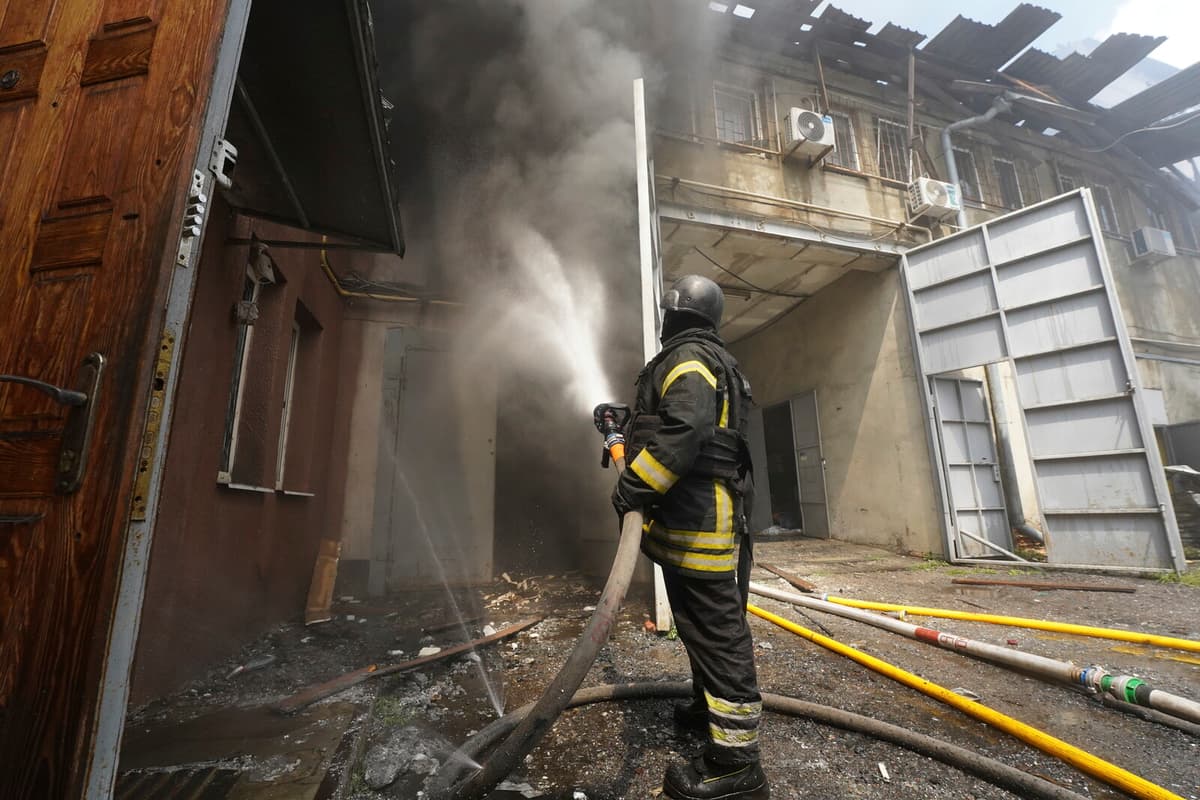Mother and IT analyst in Kharkiv wants to be anonymous but calls herself Olena. Over the phone, she talks about the drones' nocturnal humming and the children's schooling, which is characterized by constant trips to the shelters.
We must have peace, we are losing a whole generation. Russia is the aggressor, everyone is aware of it, but if the only way to stop the war is to give up parts of the occupied areas, maybe we have to accept it, she says and adds that her family and many friends reason in the same way.
Is propaganda?
Olena is aware that what she says is controversial and goes against what President Volodymyr Zelensky and many European leaders emphasized before Friday's summit in Alaska - that no decisions about Ukraine's future can be made without Kyiv.
It would be a violation of international law, but such crimes have already been committed, she says.
At the same time, she dismisses Putin's repeated claims that Russians and Ukrainians are one people as "pure propaganda".
We do not want to be part of Russia, we are Ukrainians and have a different culture. And I do not understand why Russia, which is such a huge country, thinks it needs more land.
If the "territorial exchanges" that Donald Trump hinted at before the summit become a reality, Ukrainians must be given support so they can move away from those areas, says Olena. And security guarantees from the outside world are to be desired.
On Putin's half?
Unlike Olena, who feels some hope before the Alaska meeting, economist Pavlo Shkourenko in the capital Kyiv and doctor Olena Goloborodko from Kharkiv are critical.
Worthless. The worst scenario would be if Trump is drawn in and starts playing on Russia's half, says Shkourenko, who is a sanctions analyst at the Kyiv School of Economics and has gotten used to a life with air raid warnings.
He believes that Putin, through the meeting, primarily wants to try to strengthen his grip on cities like Luhansk (in the region with the same name, which Russia illegally annexed in 2022) and Kramatorsk in Donetsk.
In one way, it's good that the meeting is taking place, it means that Russia is under pressure. But no peace agreement can be concluded without Ukraine, says Shkourenko.
Olena Goloborodko, who fled to Sweden at the outbreak of war but has just been back in Ukraine, emphasizes that her compatriots are afraid that land areas will be used as a springboard for future Russian offensives if they are given up.
Russia will not stop the aggression, she predicts.
All Ukrainians want peace, but it will not come from two leaders talking about Ukraine without Ukraine, it must be a three-party conversation.
At home in Kharkiv, where she worked at a hospital, windows are blown out and buildings are destroyed. The friends who are left are only focusing on surviving, she says.
Tina Magnergård Bjers/TT
Fact: How Ukrainians view a possible end to the war
TT
A majority of Ukrainians, 57 percent, say they are not ready to give up land or change Ukraine's westward orientation to achieve peace with Russia, according to an opinion poll published in May.
Only 11 percent say they are open to land concessions and just under 15 percent can consider changing the geopolitical orientation, according to the survey conducted by the Razumkov Center and covering 2021 Ukrainians.
At the same time, 69 percent say they are in favor of a negotiated solution to the war that makes it end as soon as possible. The proportion of inhabitants who believe that the fighting should continue until Ukraine wins has decreased to 24 percent, compared to 73 percent at the beginning of the war, shows a recent Gallup survey.
Only 25 percent believe that the fighting will stop in the near future.
Sources: Razumkov Center and Gallup
On February 24, 2022, Russia launched a large-scale invasion of Ukraine, after already entering the neighboring country in 2014, which then led to the annexation of the Crimean Peninsula and a largely frozen conflict in Donbass in the east.
In a perceived lightning-fast offensive from the north, east, and south, the Russian forces encountered resistance. They did not reach Kyiv, but advanced along the southern coast to the Crimean Peninsula. The coastal city of Mariupol fell after a long and bloody siege.
Ukraine carried out two counter-offensives in the fall of 2022, where they recaptured the Kharkiv region in the northeast and the city of Kherson with its surroundings in the south. In connection with this, Russia said it would annex the only partially occupied regions of Kherson, Donetsk, Luhansk, and Zaporizhzhia.
A larger Ukrainian counter-offensive began in the summer of 2023, but failed to force a then fortified Russian defense.
In August 2024, Ukrainian forces entered Russia and occupied part of the Kursk region.
Russia has regularly attacked places all over Ukraine with missiles and drones. At least tens of thousands of civilians have been killed in the war, but the number of unreported cases is believed to be large. Several million Ukrainians have fled abroad.






